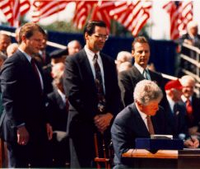In his 1996 classic, "The Clash of Civilizations," Samuel Huntington characterized Mexico as a "torn country" -- a condition produced by the Westernizing instincts of its elites pulling against the weight of its cultural heritage. Today, however, Mexico is not torn by internal discord, its drug violence notwithstanding. Rather, it is trapped -- caught between dynamic global trends washing over Latin America on one hand, and the dogged political realities of North America on the other.
In heralding the end of trade barriers between Mexico, the United States and Canada, the North American Free Trade Agreement (NAFTA) cast modern Mexico's orientation northward in 1994. NAFTA melded easy access to the U.S. market with Mexico's low production costs. Rapid industrialization of northern Mexico soon followed, giving the country a "hub-and-spoke" economic model, whereby maquiladora factories sourced inputs and investment from a variety of foreign multinationals and then exported manufactures to the United States, and, to a lesser degree, Canada.
Initially, Mexico's integration into the North American bloc showed signs of mutual benefit. The cost of many manufactured goods in the U.S. went down thanks to the pool of cheap labor used in the maquiladoras, and business-related economic indicators -- worker productivity, trade growth and foreign direct investment -- bode well for Mexico. Tech firms set up shop around Guadalajara, Mexico's second-largest city, which investors and Mexicans alike feted as a new Silicon Valley. According to the neoliberal orthodoxy that prevailed in the 1990s, these developments foreshadowed improvements in overall welfare.

